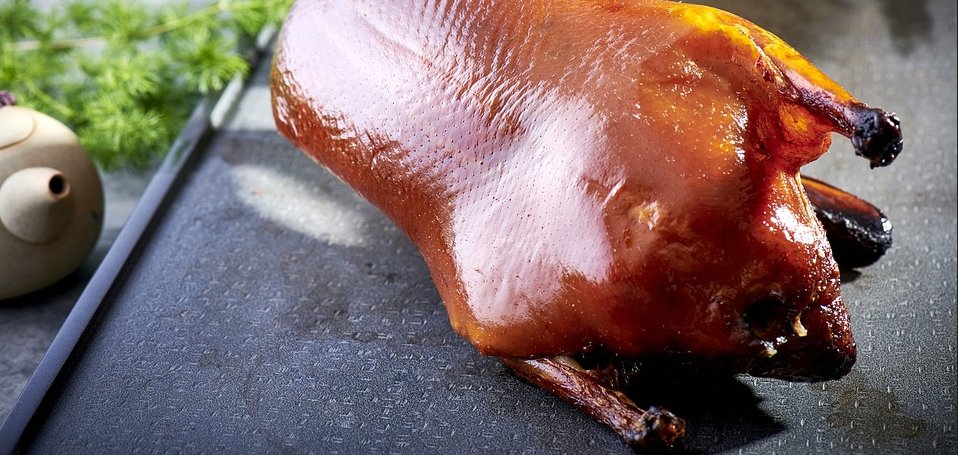Your Last Meal On Earth? I Would Be Happy With This
A recipe for Peking Duck.
May 7, 2023

If there is any upside to deprivation, it is the level of joy that an unexpected find can bring. On one humid day in Moscow, I poked about in the open freezer at Polska, the Polish shop representing the benefits of that then-Soviet satellite, and uncovered a frozen duck.
From field to freezer
When I took it home and defrosted it, it was clear it had gone straight from field to freezer, complete with feathers, innards and gunshot. Nevertheless, it was a discovery of unspeakably jubilant proportions, bringing such glee to the moment.
I plucked it, the kitchen a battleground of damp down, and pondered what best to do with this loot — but only for a second. Really, there is only one thing to do with a duck. Apologies to the French, but this would not be roasting it with orange or cherries.
There is surely no higher glory than Peking duck. It is the opportunity it gives for physically engaging with your food — the laying of a paper-thin pancake across your palm, the building of your own balance of flavors and textures from a series of ingredients, the conveyance of the glorious parcel mouthwards with your fingers, and the final sucking of sticky digits.
The history
Peking duck is not originally from Peking but from Hangzhou, near Shanghai. Centuries ago, street vendors launched the popularity of this duck, selling it door-to-door in Jinling — now Nanjing, the Ming dynasty’s first capital.
It was only when the Emperor moved the capital to Beijing in 1420 that the dish’s name was changed from Jinling roast duck to Peking roast duck.
There, chefs began to refine not the dish but the duck, calling for the breeding of a variety of a thin-skinned, white-feathered bird considered far superior to the large, black-feathered canal ducks of Jinling.
In Jinling, the ducks had been cooked over an open fire, speared on a large metal spit. But the dish became so popular, a square brick oven, a menlu, was invented in order to roast a quantity of ducks at once. It had doors on each side through which the chef reached to hang the ducks over a heap of burning embers in the center.
The oldest restaurant chain in the world
In Beijing, Old Bianyifang, a shop in Rice Market Hutong established in 1416 during the Ming dynasty, became renowned for the quality of its menlu-cooked ducks. The brand survives today, with eight Bianyifang branches in Beijing, one in Henan Province, another in Shanxi Province and a third in Inner Mongolia, making it possibly the oldest restaurant chain in the world.
Its popularity was launched thanks to a Ming Dynasty minister being falsely accused of corruption. On a fateful day in 1552, Yang Jisheng, a well-known and patriotic vice minister in the Ministry of War, was maliciously accused of various crimes.
He found himself despondently wandering the city streets when suddenly his nostrils began to twitch at tempting smells wafting out of a small tavern. Inside, he ordered the dish of the day — roast duck. He was seduced and restored to good spirits.
He returned regularly — until he was arrested and killed. But not before he had, by his celebrity presence (history’s first influencer?), established the restaurant and its signature dish. The dish became one of the main courses in imperial menus.
What is the secret?
The secret to Peking duck is in its regular basting with a honey-soy sauce while drying it in a current of air to crisp up its skin while keeping its flesh moist.
Having stripped and cleaned my Polish fowl, I dunked it swiftly into a large vat of boiling water to launch the release of the copious fat lying under its skin. I then wiped it dry and considered how on earth to move onto the basting-and-drying step.
There was very little air circulating in our flat. But we did have a balcony. So I threaded a string through the duck and hung it up on the laundry line. Throughout the evening, I stepped outside regularly to baste it and eventually went to bed.
It was early summer and in the oppressive heat we slept in our birthday suits. At some point during the night, I woke suddenly, and unable to get back to sleep, went out to the balcony to give the bird another baste.
As the sun arose, I woke again, realizing that with its imminent heat, it would soften the duck skin I was assiduously drying out.
I stepped onto the balcony armed with a stool and an umbrella. I hauled myself up onto the stool and unfurled the big red shade. Reaching up, I strapped it to a hook on the ceiling above the duck dangling from the laundry line, to protect it from the encroaching sun’s rays. For good measure, I gave the duck another painting before going back to bed.
An astonished audience
In that curious way of sensing you’re not alone, I realized by the prickling of my naked skin that as I stroked the duck with a dripping paintbrush I was being watched. I turned, brush and bowl in hand.
Across the small distance that separated our militia-guarded compound from the Russian apartment block across the way a well-built heroic mother of the Soviet Union slowly shaking out her duvet was assessing me slack-jawed in astonishment.
Hardly surprising. What she was observing was a naked westerner standing on a stool painting a duck that twirled on a string under a huge red umbrella. It was no wonder the Soviets mistrusted the westerners. Clearly they were all debauched and mad.
You don’t need to go to such exertions to make Peking Duck. Unlike me, you don’t have to make your own pancakes. They are sold in every large Chinese supermarket. And your duck will come gutted — and naked, the only thing in your version that need be.
Ingredients
1.6-1.8kg/3½-4lbs duck, fresh or thawed thoroughly if frozen
juice of 1 lemon
3 tablespoons clear honey
3 tablespoons dark soy sauce
150ml/5¼ fl oz Shaohsing rice wine or dry Sherry
20 Chinese pancakes
2 large bunches of spring onions/scallions, sliced into matchsticks
1 large cucumber, peeled, deseeded, and sliced into 7cm/3in batons
Jar of Hoisin sauce, from a Chinese supermarket
Method
Put the lemon juice, honey and soy sauce into a large pan with 1.2 liters/2½ pints water. Bring to the boil then lower the heat to low and simmer for about 20 minutes to reduce and thicken it a little.
Fill a large, deep pan with water and bring it to the boil. Dunk the duck into it for 1 minute then remove with tongs and dry it completely inside and out with kitchen paper. Set it on a rack in a roasting tin.
Lightly prod the skin all over, not too deeply nor too liberally, with the tines of a fork. With a ladle, pour the syrup over the duck several times until the skin is completely coated on all sides. Leave the duck to dry out, uncovered, in the fridge overnight, basting it 3 or 4 times more. When properly dried out, the duck skin should feel stiff. Preheat oven to 240C/465F.
Set the duck breast-side up on the rack in the roasting tin. Add 150ml/5¼ fl oz water to the tin to prevent the fat from spattering, then roast in the oven for 15 minutes. Reduce the heat to 180C/355F and continue to roast for 1 hour and 10 minutes more.
Remove the duck from the oven and let it sit for at least 10 minutes before carving it. (Reserve the melted fat for roasting potatoes). Steam the pancakes in a bamboo steamer or in a sieve over boiling water, the sieve covered with a lid, for 3-4 minutes, in batches if necessary.
Using a very sharp carving knife or meat cleaver, slice off the skin and then the meat carving both into pieces or shred the meat using two forks. Arrange skin and duck on a warm serving platter.
Serve at once with the pancakes kept warm in a tea towel or the steamer if that’s what you have used, the cucumber batons, sliced spring onions/scallions and a bowl of Hoisin sauce.
Takeaways
If there is any upside to deprivation, it is the level of joy that an unexpected find can bring.
There is surely no higher glory than Peking duck. It is the opportunity it gives for physically engaging with your food.
Peking duck is not originally from Peking but from Hangzhou. It was only when the Emperor moved the capital to Beijing in 1420 that the dish’s name was changed to Peking roast duck.
The secret to Peking duck is regularly basting it with a honey-soy sauce while drying it in a current of air to crisp up its skin while keeping its flesh moist.
In Beijing, Old Bianyifang, a shop established in 1416 during the Ming dynasty, became renowned for the quality of its ducks. The brand survives today making it possibly the oldest restaurant chain in the world.
Read previous

Saudi Arabia’s New Geostrategic Doctrine
May 4, 2023
